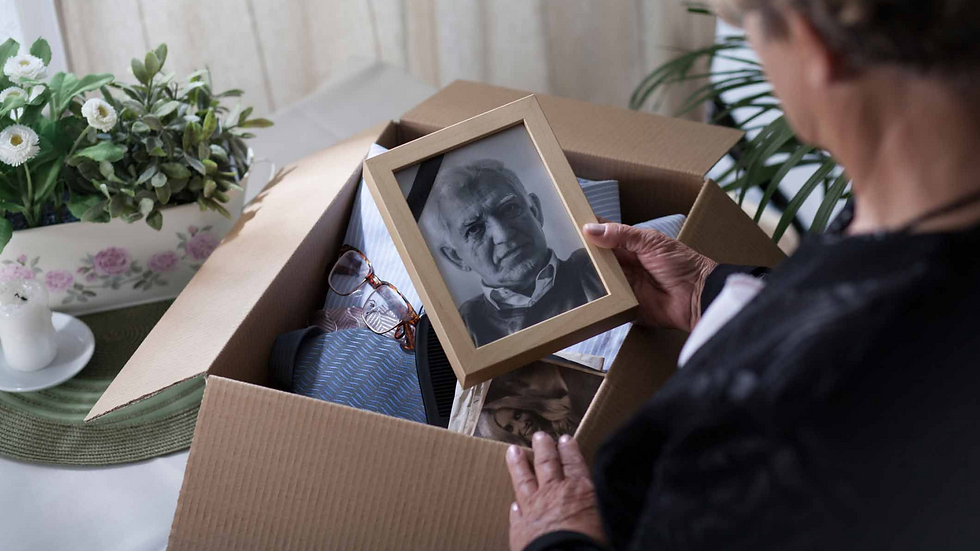Loneliness and bereavement
- hannahbeatrice7
- Jun 11, 2021
- 3 min read
We're delighted to have a guest blog from Jane Woodward, Executive Director at AtaLoss.org during Loneliness Awareness Week 2021. Founded in 2016, AtaLoss.org exists to ensure that every bereaved person in the UK can find the support that they need.
Before March 2020, few of us in Britain spent much time thinking about death. Perhaps few of us had experienced extreme loneliness. The pandemic changed all of that. As we emerge from lockdown and relax restrictions, there are now hundreds of thousands of bereaved people across the country many of whom are suffering grief and ongoing loneliness.
Especially those that have been bereaved.
Bereavement affects every aspect of our lives: practical, emotional, physical, psychological, spiritual and financial. Grief is a necessary and natural, human response to loss – a darkness that has to be faced, in order to reach a ‘new normal’ and a healthy, secure tomorrow. The good news is that if bereaved people find timely, satisfactory support most will grieve healthily and find a good way forward but ensuring that happens does need a better understanding of bereavement than most of us currently have, especially decision-makers planning for a post-pandemic world.

So why is this of concern to all of us?
The nation’s health affects us all and bereavement without good support can lead to poor physical and mental health - loss of appetite, unable to sleep, stress symptoms and general self-neglect. Loneliness is often a feature of bereavement and for those bereaved since the start of the pandemic, problems have been exacerbated by restrictions with reduced access to health care and oversight by friends and family.
Many will have been coping with their loss alone and put their grief on hold. Many older people may have been widowed years ago and, living alone, have been left feeling isolated. Others will have been grieving for their ‘normal’ life, experiencing extreme loneliness and isolation over the past year.
Clinical Director of Cruse, Andy Langford, recently tweeted that
We're seeing lots more people come back to us who've experienced a bereavement perhaps years ago, but the full force of that, all the thoughts and feelings, have come back, partly because of the loneliness they’re now experiencing.

We are likely to encounter many more people than usual in our lives and our workplaces who have been bereaved or are dealing with the fall out of loneliness as begin to connect again. And we will probably see an increasing number of people turning to the NHS via their GP for support.
The impact of bereavement and loneliness on this scale needs to be understood and planned for if we’re to avoid large scale negative outcomes and increased demand for health services for years to come. First of all, it needs to be accepted and dealt with as an experience and not a condition.

Loneliness is an experience, not a condition - reach out!
AtaLoss.org lists over 1000 services across the UK, covering the full range from national to local and specialist to general services, many now online. And many services offer befriending services, peer support groups and social groups to help combat loneliness. Also, we offer advice about how to support bereaved people - the same applies to lonely people.
Get in touch! Reach out. Help someone to connect with a local service if they are not computer savvy.
Loneliness Awareness Week is the perfect opportunity to offer the hand of friendship to someone who has been bereaved - a cup of coffee, meet up for a pint (you can now!) or go for a walk together. Or, if you are bereaved and lonely, use this as the opportunity to reach out to old friends. You never know, they could be missing you!
Loneliness often accompanies bereavement whatever your age. If you are bereaved and lonely you can find support, connect with others who ‘get it' or find helpful reads and information on AtaLoss.org.
This is the most comprehensive hub of information and support for bereaved people in the UK. Search and find support to suit you wherever you live and whatever the circumstances. We also host a FREE live-chat professional counselling service 9-9 Monday to Friday if you want to ‘talk’. Go to www.ataloss.org.



